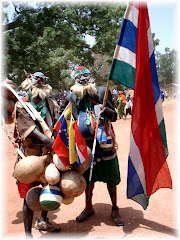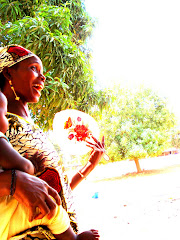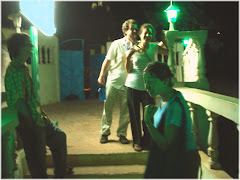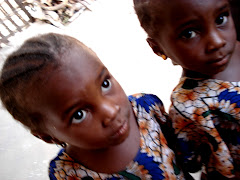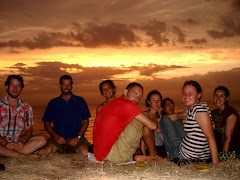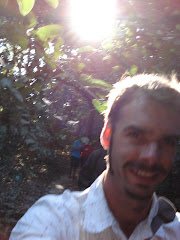Kabala is a nice town and Pa's is a nice guesthouse. Unfortunately, it is not really very close to Loma Mansa. The Lonely Planet reads "The most scenic and wildlife-rich approach to the summit is from the west, either from Kabala..." We were informed that there were no cars that went there whatsoever and that the road was horrible. "Hunert miles." Pa said. We could probably charter three motorcycles and drivers for Le200,000 each. It'd take eight or nine hours to get there but they wouldn't wait for us to make the five day trip up and down. We realized that we wouldn't be able to make the trip afterall.
We were able to make a dayhike up to the crest of Gbawuria Hill which was sort of like climbing the highest mountain in West Africa. Well, not really. But it did afford us nice views of Kabala.
We also got really dirty on that hike which was fun. And funny.
We asked Pa if he knew where we could get local honey so he arranged for Fatamata to come over. She sold us a liter for Le4000.
She wildcrafts her honey from the bush but doesn't have any hives of her own. She told us that this honey was harvested last fall and that she wouldn't be able to get any more until March.
It was thick and dark which is what West Africans seem to prefer. She said that this honey will last at least two years but we drank it straight from the bottle and finished it in a week.

Jeff needed to get his hair cut and so we set out looking for a "Barbing Shop." West African haircuts are usually accomplished with a razorblade but Jeff insisted that the barber use scissors.

We also found a game that someone had set up: They put some jars of mayonaise, bottles of Fanta, and bars of soap on the ground and charge Le100 to throw a ring to try to win a prize.

He didn't win anything.
The next day we left for Tiwai Island in the southeast part of the country. It was an all-day trek involving a lot of negotiating, some hurt feelings, and a very cramped ride. The trip from Kabala to Mekeni went alright and we experienced only two breakdowns in our bushtaxi. The car, not us. From Makeni we rode in a van (gele gele here, podh podh there) for four hours to Bo. Then we hired a taxi for the last three hours to Potoru. We met a man there who let us sleep on his floor (he asked for Le20,000 each and we agreed on Le10,000) and then he told us stories of the war. He pointed out bullet holes on the buildings around his house and said that he lived in the bush for four months eating wild yams.

The next morning we set out on a ten mile hike (to save the Le45,000 we would have spent on motorcycle rides) to the Moa River.

This was my first time ever in a closed canopy jungle and I was awestruck by the beauty of it all.

It is difficult in such a place to really see the territory unless you can climb trees to get a look around.

Tiwai Island is a community conservation program managed by the people of Koya and Barri, the Sierra Leonean government, and Njala University. It is a unique 1200 hectare island biosphere in the Gola Forest Reserve, the last remaining dryland rainforest in Africa. Pygmy hippos, river otters, chimpanzees and ten other primate species live there as well as over 700 different plant species.

We did laundry with one of the locals in the Moa River.
Jungles are difficult places to take photographs. The lens doesn't demonstrate much more than greenery.

You have to look up to see much more than the plants in your face.


We walked with a guide from the community. He told us to keep looking up.

He told us to look down. Though we wouldn't actually see the elusive pygmy hippo, we would be lucky enough to almost step in some hippo poop.

The sounds of a jungle are much more dramatic than the sights: Skitter jitter, droops, barks, whistles, and growls. Dripping water on the tent. Whispers and long-range calls. Rhythmic pulse of a bird's beak on deadwood, melodic singsong pitch warble. Monkeys and apes in stereo as one picks up the voice of another and carries it across the jungle. A silence that is itself a sort of music. River on the rocks far away a whisper. Primates in trees as branches bend and flex and drop sticks and leaves in a whoosh almost of wind, a crack almost of thunder. A quiet again as lively eyes stare back at me. The buzz of a honeybee and the cadence of crickets. Rushing of wind through wide-spread wings. Thump on a hollow log. Operatic birds create a mysterious chorus of cackling laughs and mournful wails.

Tiwai Island provides tents for the overnight adventure. We stayed two nights. Solar panels provide cold beer and lights at night. The staff is comprised of locals from nearby communities who are generous, informed, and friendly.
We hiked out to Potoru and were lucky enough to find a podh podh going to Bo with a woman throwing up in the back seat. When she wasn't, her two children were.

Bo is a strange city full of Lebanese-owned diamond buying shops and high speed internet and corrupt government officials. We got a room at the Madam Woki Hotel across from Cool Zone Rest and Relaxation. We enjoyed some afra (grilled meat on the street) and took in the up-country nightlife. Ryan and Jeff both threw-up later that night but I slept like a baby.

Bo open air market: Reeking of raw sewage and rotting trash and dry fish. Throngs of people packed ridiculously together, gawking children bumping against us, wet and black sewage splashing over our feet, blank women selling cheap wax cloth and sorrel and groundnuts, pickpockets with their fingers groping our buttocks. Shouted "Whatcha lookin fo?" and "Hey friend, how di bodi?" and "From where?" Piles of smoldering trash, stacks of used American clothes, recorded voices hawking from megaphones, distorted rap from blown speakers powered by belching generators. Fast racing drunken motorcyles slamming me obnoxiously from behind. Not at all unique or inspiring.

Lovely children in the streets carrying overflowing buckets of rotted trash on their heads. A boy learning to drive a motorcycle stalling it over and over again and being laughed at by a policeman weilding a machine gun. The golden sun hanging in the smoky sky backlighting tall minarets atop the big downtown mosque. A rooster. Fried plaintains. Chubby Lebanese kids sucking on Cokes behind the counters of diamond-buying shops while their shrouded mothers stare aloof from barred upstairs balconies. A dog chasing another dog down the silt street. A car on flames with a black smoke trail strangling the city while men passively play checkers on a homemade board. Women together bent at the waist sweeping the earth with brooms made from palms. The most melodic call to prayer I've ever hear sung loud, proud into the polluted cloud of my first morning in Bo.

That morning we awoke to the pollution of a West African atmosphere. My eyes were burning and my throat was scratchy. I didn't realize that, like The Gambia, Sierra Leone also imposes "Clean the Nation Day" whereby cars are not allowed to be on the road, shops remain closed, and everyone is expected to burn their piles of plastic bags, donkey shit, and worn-out clothing. I decided to walk to a shop to purchase lye to wash my clothes in the bathroom sink but was quickly stopped by a police officer who beckoned me over to him.

He asked what I was doing out wandering around. "Don't you know that today is Clean the Nation?" he asked. I said I didn't. He told me that it was against the law to leave your compound or hotel until 10:00 and it was only 9:15. "Do you agree with me that you have broken that law?" I noticed that his eyes were a bit glassy and he seemed to smell of palm wine. I guess that I had to agree that I had broken that law and so I said "Yes." He had me right where he wanted me. "So do you also agree that you are under arrest?" We debated that issue for a short time and then he instructed me to follow him to the police station. We started to stroll but he was in no hurry. He told me that he hadn't been paid in a long time and that it was a shame that even the public servants were poor in his country. Maybe if he had a friend from America... I started to catch on. Suddenly I saw Ryan walking towards us. Apparently he didn't know the law either and Officer Barri asked him if he agreed that he was under arrest. The three of us tarted to stroll towards the station when three other cops showed up and demanded identification from us. Ryan showed his passport and I showed my Peace Corps id because mine was in the hotel. They told us to come to the station for interrogation and to verify our status in their country. Officer Barri became defensive. Either he had grown to like us (after I had given him a fake American phone number and promised to let him stay at my house if he was ever in Europe) or was playing good-cop bad-cop. Either way, an argument between them took the heat off us. Eventually they all grew tired of the discussion and agreed that were no longer arrested.

Back near Freetown we had a few nights remaining and a small cache of leones that we didn't want to waste. We'd been eating so many meals made of sardines mixed with a can of hummus and smeared on bread that we were super hungry for good Italian food. We found a beautiful resort called Franco's down the beach in Sussex that had been built over the past thirty years.

Franco let us put our tents up in the grass beneath a few coconut trees and only charged us about five bucks for each tent.

The downside of the site was that you couldn't lock up any valuables so we had to keep a close watch on things. There were a few hellion children running around throwing Coke cans in the ocean and clowning with the wildlife. We couldn't say anything because some of them were Franco's kids and some were the spawn of Bruno, one of Franco's expat friends from Germany. Our first night we turned-in rather early due to the exhaustion of lounging on the beach all day. The kids were full of pent-up energy from drinking soft drinks and eating buttered noodles and so were running around our tents. We tried to ignore them when Leo spat on Jeff's tent as he ran past and kicked Ryan's. Some one of their drunk fathers gave them sparklers and before we knew what was happening Ryan's tent was melting beneath a wash of bright sizzle and sulphur smell. We were livid and chased them into their houses where they cowered like the animals that they were. We tried to reason with Franco and Bruno but Franco was impossible to understand and Bruno was disastrously drunk. He patted little Leo's nappy hair and said "Did you set the American Army tents on fire?" "Not me Papa. Honest." Bruno shrugged and looked at us blank as a fart. "Be reasonable. Do you think he was trying to kill you?" He staggered back to his hotel room. Franco mumbled something about letting us keep our five bucks for the night.

We met a man from Las Vegas Nevada wh has lived here for sixteen years. He was a mercenary during the war and told us stories about his life here. Now he mines uranium and other precious metals. We also met a woman named Sarah from the United Kingdom who was on the final days of her volunteer work in Sierra Leone before heading home.

We headed back to Freetown for our last night. We found a nice brothel where they only charged us $8 per person and looked the other way: Sierra Leone has a law that restricts more than one person of the same sex from staying in the same room. We struggled throughout our entire trip promising hotel managers that we were brothers and that we swore not to engage in ungodly acts together in their houses of disrepute.

We went shopping for last minute
silafonda- gifts to be given to host families upon our return home.

I bought myself a big grass hat and a barracuda-bone necklace for my girlfriend in The Gambia.

The next morning we went to the airport where we were informed that there was a US$40 "departure tax" that we would each have to pay before we could board the plane. I guess it was appropriate.

We said "Goodbye" to Sierra Leone and wondered if we would ever return. I am excited to get back home now to do some work.
 A botfly laid her egg in my clothes which then hatched into my arm which then found nourishment of my flesh.
A botfly laid her egg in my clothes which then hatched into my arm which then found nourishment of my flesh. 
 It popped out and now I'm on the mend. Unless there was more than one that is...
It popped out and now I'm on the mend. Unless there was more than one that is... A botfly laid her egg in my clothes which then hatched into my arm which then found nourishment of my flesh.
A botfly laid her egg in my clothes which then hatched into my arm which then found nourishment of my flesh. 
 It popped out and now I'm on the mend. Unless there was more than one that is...
It popped out and now I'm on the mend. Unless there was more than one that is... Ryan and Jeff and I were intrigued about this tropical place south of The Gambia called Sierra Leone so we left together on a two week trip. We had spoken with a few other Peace Corps Volunteers who had travelled there, checked a few websites, and looked through tattered copies of the Rough Guide and Lonely Planet. At the consulate in Banjul before we left, we were told to greet a few people. Then we were told to pay US$100 for the entry visa. The roundtrip tickets were US$300 from The Gambia to Freetown.
Ryan and Jeff and I were intrigued about this tropical place south of The Gambia called Sierra Leone so we left together on a two week trip. We had spoken with a few other Peace Corps Volunteers who had travelled there, checked a few websites, and looked through tattered copies of the Rough Guide and Lonely Planet. At the consulate in Banjul before we left, we were told to greet a few people. Then we were told to pay US$100 for the entry visa. The roundtrip tickets were US$300 from The Gambia to Freetown.



 I spent my downtime reading A Bend In The River by V.S. Naipaul. He wrote things like "...as I got deeper I thought: But this is madness. I am going in the wrong direction. There can't be a new life at the end of this."
I spent my downtime reading A Bend In The River by V.S. Naipaul. He wrote things like "...as I got deeper I thought: But this is madness. I am going in the wrong direction. There can't be a new life at the end of this."
 We also discovered a small hole-in-the-wall shop in Freetown called Barrack Obama Tea Shop which Ryan took a photograph of with Jeff proudly in front. We were immediately derided by the owner of the shop telling us that we had to pay him to take that photograph. He wanted to smash the camera and acted like he wanted to fight us. When we tried to rebutt that, since we had elcted Mr Obama, this man should pay us to use our President's name to sell over-priced cups of Nescafe he walked off in a huff complaining that we were selfish.
We also discovered a small hole-in-the-wall shop in Freetown called Barrack Obama Tea Shop which Ryan took a photograph of with Jeff proudly in front. We were immediately derided by the owner of the shop telling us that we had to pay him to take that photograph. He wanted to smash the camera and acted like he wanted to fight us. When we tried to rebutt that, since we had elcted Mr Obama, this man should pay us to use our President's name to sell over-priced cups of Nescafe he walked off in a huff complaining that we were selfish.



 No. 2 River Beach is a community-owned project on a beautiful beach of white sand with mountains rising practically right out of the Atlantic.
No. 2 River Beach is a community-owned project on a beautiful beach of white sand with mountains rising practically right out of the Atlantic.

 Ryan bought a bottle and we drank gin on No 2 Beach. Ryan ordered the baracuda skewers for Le30,000 and Jeff and I ate a plate of rice drenched in palm oil and wilted cassava leaves in a nearby village for Le1,000 each. We also were given roseheart fruits, bananas, and mangos.
Ryan bought a bottle and we drank gin on No 2 Beach. Ryan ordered the baracuda skewers for Le30,000 and Jeff and I ate a plate of rice drenched in palm oil and wilted cassava leaves in a nearby village for Le1,000 each. We also were given roseheart fruits, bananas, and mangos.



 Some help get the word out on the medical care that is available.
Some help get the word out on the medical care that is available.


 And maybe all the travelling was making us a little loopy.
And maybe all the travelling was making us a little loopy.









 The next morning we set out on a ten mile hike (to save the Le45,000 we would have spent on motorcycle rides) to the Moa River.
The next morning we set out on a ten mile hike (to save the Le45,000 we would have spent on motorcycle rides) to the Moa River. This was my first time ever in a closed canopy jungle and I was awestruck by the beauty of it all.
This was my first time ever in a closed canopy jungle and I was awestruck by the beauty of it all.



 You have to look up to see much more than the plants in your face.
You have to look up to see much more than the plants in your face.
 We walked with a guide from the community. He told us to keep looking up.
We walked with a guide from the community. He told us to keep looking up.

 Tiwai Island provides tents for the overnight adventure. We stayed two nights. Solar panels provide cold beer and lights at night. The staff is comprised of locals from nearby communities who are generous, informed, and friendly.
Tiwai Island provides tents for the overnight adventure. We stayed two nights. Solar panels provide cold beer and lights at night. The staff is comprised of locals from nearby communities who are generous, informed, and friendly.




 He asked what I was doing out wandering around. "Don't you know that today is Clean the Nation?" he asked. I said I didn't. He told me that it was against the law to leave your compound or hotel until 10:00 and it was only 9:15. "Do you agree with me that you have broken that law?" I noticed that his eyes were a bit glassy and he seemed to smell of palm wine. I guess that I had to agree that I had broken that law and so I said "Yes." He had me right where he wanted me. "So do you also agree that you are under arrest?" We debated that issue for a short time and then he instructed me to follow him to the police station. We started to stroll but he was in no hurry. He told me that he hadn't been paid in a long time and that it was a shame that even the public servants were poor in his country. Maybe if he had a friend from America... I started to catch on. Suddenly I saw Ryan walking towards us. Apparently he didn't know the law either and Officer Barri asked him if he agreed that he was under arrest. The three of us tarted to stroll towards the station when three other cops showed up and demanded identification from us. Ryan showed his passport and I showed my Peace Corps id because mine was in the hotel. They told us to come to the station for interrogation and to verify our status in their country. Officer Barri became defensive. Either he had grown to like us (after I had given him a fake American phone number and promised to let him stay at my house if he was ever in Europe) or was playing good-cop bad-cop. Either way, an argument between them took the heat off us. Eventually they all grew tired of the discussion and agreed that were no longer arrested.
He asked what I was doing out wandering around. "Don't you know that today is Clean the Nation?" he asked. I said I didn't. He told me that it was against the law to leave your compound or hotel until 10:00 and it was only 9:15. "Do you agree with me that you have broken that law?" I noticed that his eyes were a bit glassy and he seemed to smell of palm wine. I guess that I had to agree that I had broken that law and so I said "Yes." He had me right where he wanted me. "So do you also agree that you are under arrest?" We debated that issue for a short time and then he instructed me to follow him to the police station. We started to stroll but he was in no hurry. He told me that he hadn't been paid in a long time and that it was a shame that even the public servants were poor in his country. Maybe if he had a friend from America... I started to catch on. Suddenly I saw Ryan walking towards us. Apparently he didn't know the law either and Officer Barri asked him if he agreed that he was under arrest. The three of us tarted to stroll towards the station when three other cops showed up and demanded identification from us. Ryan showed his passport and I showed my Peace Corps id because mine was in the hotel. They told us to come to the station for interrogation and to verify our status in their country. Officer Barri became defensive. Either he had grown to like us (after I had given him a fake American phone number and promised to let him stay at my house if he was ever in Europe) or was playing good-cop bad-cop. Either way, an argument between them took the heat off us. Eventually they all grew tired of the discussion and agreed that were no longer arrested.





 I bought myself a big grass hat and a barracuda-bone necklace for my girlfriend in The Gambia.
I bought myself a big grass hat and a barracuda-bone necklace for my girlfriend in The Gambia. The next morning we went to the airport where we were informed that there was a US$40 "departure tax" that we would each have to pay before we could board the plane. I guess it was appropriate.
The next morning we went to the airport where we were informed that there was a US$40 "departure tax" that we would each have to pay before we could board the plane. I guess it was appropriate.
















